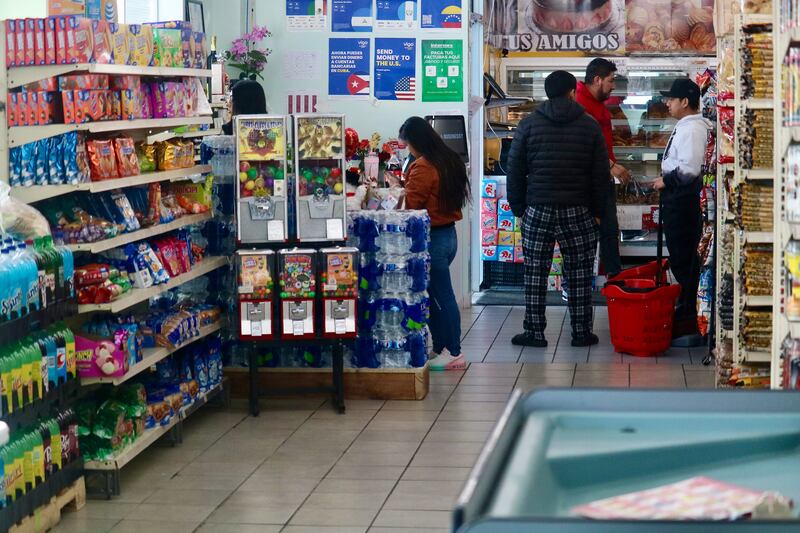DeKALB – DeKalb City Manager Bill Nicklas is recommending that the city enact a local 1% grocery tax, arguing that not doing so would slash needed funds for city departments responsible for keeping the public safe.
Losing that tax would affect the city’s police, fire and public works operations, which get their largest chunk of funding through the grocery tax, officials said this week.
The DeKalb City Council is expected to consider implementing the local tax at its next meeting, set for 6 p.m. Monday at the DeKalb Public Library, 309 Oak St. If approved, the local tax would go into effect in January, after the state tax goes away.
DeKalb city officials have argued that the tax is needed to ensure consistent services for area residents. Nicklas recommended that the City Council approve the tax, according to documents released ahead of the meeting. He said if the city were to lose the amount it collected in last year’s grocery tax revenue – about $800,000 – a corresponding effect would mean less collected in sales and use tax.
“A 5% reduction in the largest revenue stream supporting city-operating departments will almost certainly lead to cuts in operating expenditures,” Nicklas wrote in his pitch to the council.
When reached Friday, Nicklas said the city’s spending budget also comes from sales tax, use tax, fines and fees. He previously said all money collected through property taxes goes to DeKalb pension obligations.
The 1% grocery tax is commonly charged on items consumed at home or prepared at home, according to city documents. Excluded from this taxation are deli items sold by weight, fresh fruits and vegetables, meat trays, breads and bagels, and items sold in pre-measured containers such as ice cream.
The city of DeKalb passed a $35 million fiscal 2025 budget in December. City leaders including Mayor Cohen Barnes have argued that, if the city adopted a local grocery tax, it would be a continuation of what’s already happening. The state of Illinois is already taxing groceries, which would stop in January. The city would then take up that tax if approved.
:quality(70)/cloudfront-us-east-1.images.arcpublishing.com/shawmedia/T7J5NI3DRRDP5OFUIZPSNKQMHA.JPG)
Nicklas also argued that the grocery tax would not hurt DeKalb’s poorest residents, including those who use Supplemental Nutrition Assistance Program benefits, since SNAP purchases cannot be charged a grocery tax.
“The SNAP program is designed to serve the poorest among us and defines eligible households by reference to 165% of the federal poverty level, which varies according to household size,” Nicklas wrote.
[ ‘Something really evil about taxing food’: No to 1% grocery tax in unincorporated DeKalb County ]
Council action comes in the wake of Gov. JB Pritzker eliminating the grocery tax at the state level, arguing that it was needed to help lift burdens on Illinoisans’ wallets. Some municipal leaders across Illinois have said that was done without a plan to replace needed revenue collected through that tax, which could harm local budgets.
The legislation allows municipalities to implement a 1% grocery tax through an ordinance instead of a referendum. That ordinance could go before the DeKalb City Council for approval pending Monday’s discussion.
Other local towns already have discussed, voted down or approved local taxes on groceries in recent weeks. The neighboring Sycamore City Council vocalized early support of the tax in May, although no final decision has been made. The DeKalb County Board voted down the tax also in May, however. A countywide tax only would have affect purchases made in unincorporated areas.
Sandwich Mayor Todd Latham has argued that losing a grocery tax would cut needed city budget funds.
According to city documents, a local grocery tax may only be levied at 1%, and not any other increment.
Nicklas noted that whatever decision DeKalb city leaders make won’t affect the state of Illinois.
“The current tax is a pass-through, so its elimination is no loss to the state of Illinois,“ Nicklas wrote. ”If a home-rule community opts to impose a 1% grocery tax to replace the tax removed by the state on Jan. 1, 2026, the grocery tax will continue to be collected by the state and remitted to the home-rule community after a 3% administrative processing fee is imposed.”

:quality(70)/author-service-images-prod-us-east-1.publishing.aws.arc.pub/shawmedia/670e1b81-921a-4140-9c50-69b66cad217c.jpg)